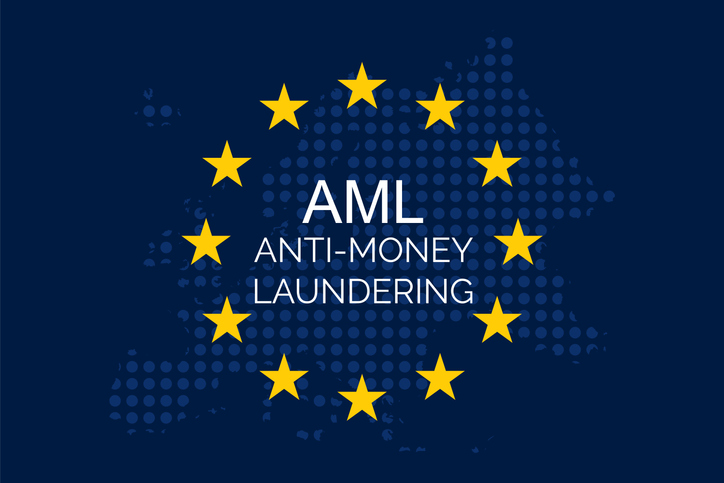With the passage of the EUs 5th 'MLD' (Money laundering Directive) to include VASPs (Virtual Asset Service Providers) / Crypto firms to ID&V and monitor transactions in line with recording and reporting obligations. There has been a rapid need for fellow Anti Financial Crime practitioners and operating model change agents within 'FS' (Financial Service) to upskill and expand their knowledge. That goes way beyond KYC and alert handling. The evolution of NextGen Tech 'DLT' (Distributed Ledger Technology) has generated a flourish 'DeFi' (Decentralised Finance) ecosystem of Crypto / 'VA's (Virtual Assets) that has paved the way for start-up tech firms to facilitate and offer exchange and safe custody of VA's. These VASPs as a start-up industry, is gaining the traction of transaction trust from a user community, as well as many established FS's (like VISA) and many jurisdictional regulators, that now embeds Crypto within the formal financial system.
A community of knowledge sharers

Considering current and historical wrongdoing. The inherit risks of borderless Blockchain that in many use-cases, abuses pseudonymisation to disguise identity to circumvent AML controls when storing or transferring dirty value, that facilitates illicit harm to people the environment. The good news is 'Anti Crypto Crime' communities, organisations and technologies are now GLOBALLY popping up, responding, and flourishing by offering brilliant FREE webinars, training sessions that in-turn are Masterclasses of refined and continued academic debate. All that have incredibly esteemed panellists and participants, via forum-chat, as a rich knowledge source.
It goes without saying, money laundering does not respect boarders, so I for one am grateful for such a global and borderless response from a group of diverse and talented thought leaders. Highlighting the ongoing challenges of the ramp up and adoption of VAs / NFTs (Non-Fungible Tokens) as a credible asset-class. As well as the technologies AKA Crypto RegTechs, that brings the much-needed confidence and integrity to the DeFi and smart contract marketplace, that again is a borderless ecosystem. That presents a new wave of jurisdictional enforcement problems, as well as operational pain points and accountability tensions that need to be ironed out and ratified , as the ecosystem evolves and compliance frameworks mature to meet sound governance expectation.
Further, these new learnings provide opportunity to be ahead of the curve, with the understanding and application of FATF guidance and the much awaited 'Travel Rule' that is generally cascaded and put into force by sovereign states. As stipulated regulation and legislation, thus deter governmental ignorance, and prevent member states going to grey list during the 'FATF country mutual evaluation' process.
Sanctions and ramifications of non-compliance
As we are all too aware Crypto / VAs can sadly be misused for nefarious activities predominantly with the rise of ransomware. COVID has created a work at home culture, that has expanded the cybercriminals attack surface to exploit certain vulnerabilities. Bad actors who have held many firms siege with ransomware for a ransom. Demands of a ransom always being requested via payment of Crypto. It must be noted that the U.S authorities have taken some lead to tackle this problem. OFAC has designated numerous malicious cyber actors under its cyber-related sanctions program. With over 800 VASPs in 80 countries, it is imperative to screen against OFAC watchlist irrespective of jurisdiction.
If there is any suspicion or evidence that bad 'cyber actors' are extorting ransomware payment may be sanctioned or otherwise have a sanctions nexus. OFAC has designated numerous nefarious cyber actors under its cyber-related sanctions program and other sanctions programs, including cyber criminals and those who facilitate ransomware transactions as a VASP. OFAC has provided clear details for contacting relevant U.S. government agencies -including DEA, FBI, FinCEN and OFAC and has highlighted sanctions risks in on the (US) treasury.gov website. VASP or any entity that facilitate ransomware payments to cyber actors on behalf of victims, including financial institutions, cyber insurance firms, and companies involved in digital forensics and incident response, not only encourage future ransomware payment demands but also may risk violating OFAC regulations, therefore putting themselves and the key principles at risk of being placed on the OFAC sanctions list. Which no law-abiding citizen would wish for.
Plausible justification for Crypto
Equally, legitimate rationales such as data privacy and humanitarian, like unbanked refugees who have worked hard and need to store value against oppressive regimes or those who got on the Crypto bandwagon early. As traditional and 'CeFi' (centralised finance) and DeFi converge as a trusted and traceable conduit to transfer value globally. Irrespective, if you are currently working for a FS firm that has an all-out ban on VASPs / Crypto firm onboarding. You simply cannot steer away from the complexities and nuanced affiliation that many AML practitioners will have to consider then opine, when met with a segment of Crypto when investigating both source of funds, wealth, and transaction. I very much doubt any bank will offboard Tesla or Elon Musk's interests, who publicly advocates and invests in virtual assets and coins.
Crypto's SOW
As this emerging breed of Crypto millionaires become HNWI (High Net Worth Individual) type, they will unequivocally have to demonstrate a credible narrative of how they derived their wealth, as they seek to diversify investment and spender (who would not!), that is SO reliant on traditional finance payment networks to procure luxury and high lifestyle living.
As this trend accelerates, there is an imperative discipline for rigorous, verified and validated 'SOW' (source of wealth) memo's that can sufficiently prove Crypto wealth, that is not placed or integrated from cyber-criminality or any other predicated offences, as prescribed within EUs 6th MLD. But, from the good investment of the surge of Crypto value, that will need a forensic and plausible audit trail to appease competent authorities and regulators.
Conclusion
illicit finance, be it proceeds of crime or good value funding wrongdoing like terrorism, unfortunately fuels adverse life changing ramifications, at worst costs lives, as well as conservation and environmental impact. As we all strive to continually improve to be vigilant and be better versions of ourselves. I could not encourage more a wider community of experts or Financial Crime experts to broaden their AML scope within VAs / Crypto. Again, these webinars are FREE and inclusive to all! That affords every AML practitioner, the permission to learn, by getting involved and participating into this evolving, comprehensive and fascinating conversation.
My view is Crypto is not going away, and compliance is a collective zeal, therefore, should be collaborative, never competitive.
This is a guest blog written by James Emin in association with Twenty84 and Raw Compliance.
James Emin is a qualified AML and GDPR compliance Business Analysis and Project Manager. 15 years of experience within Financial Crime, starting as a KYC analyst through to becoming an SME, as a career contractor. Whilst supporting and running change management projects at many leading regulated institutions, was then that he realised technology would be adopting much of the human effort that drove him to be a BA, tech change agent and thought leader. Therefore, he is passionate about nuancing the complexities of illicit value, from storage to borderless transfer and how Fincrime operating models need to be resilient to meet ongoing threats and typologies by using both agile and Value Engineering methodologies to optimise resources. Ranging from Proliferation Finance, FinTech and Regtech which led him to scribe other thesis's.
He holds an International Diploma in Business Analysis (BCS) and is AgilePM, Prince2, GDPR certified at practitioner level.
Raw Compliance provides a global platform for compliance professionals, and those interested in compliance, to build a global community to develop new skills, learn from experts, collaborate, network and try new initiatives.


AML is not without its accomplishments. The UK has been instrumental in establishing the Financial Action Task Force. Money laundering has been criminalised and covers the proceeds of all crimes. Europol has established itself in the fight against money laundering. The Egmont Group of financial intelligence units has been set up. The UK and 14 EU member states (plus the European Commission) are full FATF members and the remaining 13 are members of Moneyval. Governments evaluate each others' AML performance every so often. The term "money laundering" is now in common parlance.
However, the amount of proceeds of crime recovered as a result of successful money laundering prosecutions, as against the amount thought to be available to be laundered, is around 0.1-1.1 percent at best. Commission of the underlying predicate offences remains rife, and increasing, particularly in relation to emerging and disturbing criminality, such as the exponential growth of green crime and cybercrime.

Brexit has thrown in more challenges:
• Title X of the Brexit Withdrawal Agreement advocates supporting international AML/CFT efforts, the need to cooperate and to share information, but this is much looser than previous arrangements. That part of the agreement relating to AML is a mere 2 ½ pages, of which 2 pages are focused on Ultimate Beneficial Ownership
• The UK no longer has access to the Schengen Information System and related crime fighting databases. There is liaison through British embassies locally, but it is very much a "dialled down" relationship
• Although the UK has implemented EU MLD 5, "implementation" of MLD 6 and copycat steps of future EU regulation remain to be seen. In many areas new UK regulation is being prepared which will diverge from the EU, making decisions of equivalence, and thus cross border trade and action against international organised crime, far more difficult
• At a practical level, UK firms will have to follow local rules when dealing with EU based clients, and vice versa. This impacts cost, speed, effectiveness and profit
• Criminal organisations will exploit areas of confusion uncertainty and bureaucracy around Brexit, and new scams are expected
Increasing AML Effectiveness: Three focal points
At the same time, the EU Task Force on Improving AML Effectiveness around Europe has just released its report (https://www.fmli.co.uk/aml-in-europe-time-to-get-serious/). In it, the major AML issues in Europe are divided into three pillars: governance, risk management and capability. Some feel improving effectiveness is a simple question of reforming the European AML supervisory architecture with a new EU AML supervisor, but the answer is much more complex and nuanced than that. Such a step needs to be matched with action, commitment and improvements in capability to fight money laundering.
Pillar One: Governance
There are many fault lines across Europe in relation to AML governance. Brexit only adds to them:
• Both Europe and the UK lack a clear objective for what the AML regime is meant to accomplish. Without clarity of vision, mission and modus operandi, it is difficult to see how progress can be achieved. Most governments seem to focus on fining gatekeepers rather than convicting the perpetrators of predicate offences. AML compliance has become an end in itself. This is ineffective in reducing the scourge of drug, people, wildlife and firearms trafficking across Europe, etc.
• Only 15 EU nations are FATF members of FATF. 19 of the 28 EU member-states are members of the Eurozone. These fault lines cause dislocations across Europe.
• There is no EU coordinating body for AML policy except for the European Commission, with certain monitoring and supervisory functions carried out by the European Central Bank and European Banking Authority, and some loose information-sharing arrangements between national authorities. The report recommends creation of a new EU AML body, but with caveats
• The enforcement of criminal laws is reserved for individual member-states. True, there is some coordination of investigations through Europol, and instruments such as the European Arrest Warrant have been created, but usage of such tools varies wildly across the bloc.
• There is a real bottleneck in the FIUs. However, care must be taken that removing this does not just shift the problem to law enforcement and judiciary
Governance is not just about architecture, however. It's also about "battle rhythm":
• The gestation periods of legal and policy measures are far too long. For MLD 4, "flash to bang" time (from FATF policy development to implementation of law) was well over a decade. This is far too long. Such lag times undercut efforts to respond to the explosive growth of green crime, cybercrime and other issues.
• The mutual evaluation cycle is also around a decade long. Businesses are subject to annual reports, examinations and monitoring. Why should this concept not also apply to AML deterrence at governmental level? There is currently no annual assessment of country performance against FATF recommendations.
Pillar Two: Risk Management
No key performance indicators (KPIs) have been set by FATF, and countries are not even collecting data on underlying offences in a scientific manner, yet this is vital for effective policy development. How can policies be effective if you don't know the numbers? FATF has developed some indicators ("Immediate Outcomes"), but these are not the same as KPIs directly tied to predicate offences. An assessment of what really needs to be measured is urgently required to develop the correct tools, fund the most effective action and reduce the ever-growing scourge of underlying crimes. Greater government commitment is necessary. The report recommends better use of OKRs and KPIs at national and institution level.
Risk-based deterrence has been introduced to reduce compliance burdens and increase effectiveness. Although highly attractive conceptually, it has stumbled in practice, largely because the regulator decides what the risk is, rather than allowing firms to carry out their own risk function, with regulators verifying that the risk process works and firms honing their risk-assessment skills.
In assessing how deterrence should work, many have latched on to the three-lines-of-defence principle. This follows the old concept of castle building—the outer wall is the first line of defence, the inner wall the second, and the keep the final line. While fine for mediaeval strongholds, the only organisation building castles these days is Walt Disney.
For financial institutions this concept has customer-facing staff as front line, compliance as second line and audit in the castle keep. As a fortification against money laundering, the principle is outmoded and ineffective. It encourages the wrong mentality. Better a system of integrated active defence, where all AML assets are designed to work together in a manner similar to Integrated Air Defence Systems or Carrier Battle Groups.
Pillar Three: Capability
Training of law enforcement in how financial markets work is generally below what it could be. Virtually all law enforcement officers are given financial investigation training, but this is not the same as instruction in the operation of financial markets. Specialist financial police are needed, properly trained and supported. Commitment currently ranges from FIUs of just one officer, to specialist police like the Guardia di Finanza with around 70,000 persons.
Huge fines are levied on banks, yet governments appear unwilling to fund even small law enforcement projects to upgrade creaking IT systems. They even talk of special levies. Transparency over fines money is needed.
AML compliance has become an end in itself, with the real objectives lost in organisational data kleptomania. Digitisation of business has given rise to a search for an automated AML nirvana, reducing human input to a bare minimum. Yet AML is a human issue and programming errors can increase costs dramatically, as battles to reduce false positives have shown. Certain banks employ more staff on false positives than their national police force has in fighting money laundering. This needs rethinking.
Compliance is often seen as all cost with little or no benefit. Do some CEOs prefer to run the risk of fines to ensuring their business models and compliance functions are properly aligned, effective and efficient?
The Way Forward
So where does the solution lie? The following steps and options are recommended:
Governance:
• Develop clarity of vision and mission. Processes need to impact the underlying crimes, or there is no point introducing them.
• Develop a new AML body within Europe but be careful on governance. Sort out FIU.net.
• Ensure coordination between EU member states, and third countries, at all levels.
• Improve cross border cooperation at all levels, including data collection, intelligence generation, policymaking, investigation, information exchange, prosecution, etc.
Risk Management:
• Adopt OKRs and KPIs that relate to AML objective and underlying crimes. Measure what matters. Use the right metrics. Improve databases.
• Allow firms to develop and use risk-based systems properly.
• Carry out effective benefit-cost analysis of new laws and procedures.
• Adopt aggressive, coordinated defences.
Capability:
• Encourage training and spending on specialised financial police.
• Increase funding and support of law enforcement, enabling following the money trail.
• Improve training standards, including the courts process, policy makers, investigators and intelligence analysts.
The Future
We cannot go on as we are. Money laundering, like climate change and the threats to the natural world, is a truly international issue and needs a truly international response. We need a new agenda aligned to climate change and biodiversity steps the world needs to take urgently for its own survival. We must not be found wanting.
 This is a guest blog post by Richard Parlour. Richard is a co-rapporteur for the EU Task Force on Increasing AML Effectiveness Across Europe. His focus is on all aspects of AML from policy to due diligence, investigations and training.
This is a guest blog post by Richard Parlour. Richard is a co-rapporteur for the EU Task Force on Increasing AML Effectiveness Across Europe. His focus is on all aspects of AML from policy to due diligence, investigations and training.
At the time of writing, the UK is currently experiencing restrictions with the way we live and work in attempts to manage the impact of the COVID-19 pandemic.
This has seen the temporary (and unfortunately in some cases, permanent) closure of many businesses and organisations across the nation. And when it comes to compliance, financial crime and risk hiring, candidates looking to secure a role in these sectors are likely to have had their application processes postponed or even rescinded.
This is an uncertain time for both recruiters and candidates; but what it does give us is a moment of pause to consider what we can do to become even more successful once we emerge from this pandemic. At Twenty84, we are taking this as an opportunity to think about what we can change or improve; and in order to continue helping risk and compliance specialists throughout this crisis, we have come up with the following 7 things that risk, financial crime and compliance candidates should do while they now have the time, and before the pandemic is over:
7 things compliance, financial crime and risk candidates should do during the COVID-19 pandemic
1. Stay up to date with sector news and risk and regulation updates
Despite the current restrictions, risk, compliance, and financial crime issues, challenges and regulatory demands remain. In fact, there have been reports of increased financial crime since the outbreak of the virus. New and updated compliance regulations are also coming into play constantly, so be sure to keep an eye on these, particularly when you have a few minutes to spare. By keeping on top of current news and regulations, you’ll not only be in the right frame of mind to work on applications, but you’ll also impress interviewers with your up-to-date and relevant knowledge. Be sure to keep an eye on industries where there maybe an uptick: for example FinTech finance apps, digital banking, contactless payments and so on.
2. Stay in touch with other professionals
With everyone at home and with more flexibility now is a great time to stay in touch with other professionals and re-establish contact with old colleagues. Although you will not be able to see them face to face during the pandemic, this does mean that you will have more time to get in touch via phone call or for a virtual coffee and discuss the latest updates in the sector, bounce different ideas around, and subsequently keep a strong and alert risk, financial crime/compliance mindset. You may even find that new opportunities begin to present themselves!
3. Make yourself available for contract/interim work
Now that changes to IR35 regulations have been postponed until 2021, this time of quiet offers a great opportunity to make yourself available for any contract or interim work that might be available to complete remotely. If you decide to do this, be sure to change your availability on any online profiles to available for “contract”, as well as on your favourite job sites. You should also let your recruitment agency know of this update, and change your LinkedIn settings to show your interest in contract roles, as well as updating your LinkedIn profile headline to show that you are open for permanent and contract/interim positions. Any experience you can gain between now and the end of the current pandemic could be transformative to your application processes in the future!

4. Complete online training courses
Being a risk and compliance professional, it’s likely that, although you will have completed your necessary training, you’re unlikely to have the time to further this. Now is therefore the perfect opportunity to do so. While all in-person training and learning opportunities in financial crime, risk and compliance are suspended for the time being, there are a multitude of risk and compliance training courses and webinars that can be accessed online. While you are at home during these restrictions, be sure to explore these opportunities to brush up on your current skills and learn some new ones. You can usually print out certificates at the end of these online courses, which will look great in your portfolio! Which leads us on to:
5. Update your CV/portfolio of experience
Due to your busy schedule, you may not often find the opportunity to update your CV. While you are working on online training courses, be sure that you also take a look at your CV and make sure all the essential information is present and correct. If you don’t currently have a portfolio, this period has provided the perfect opportunity to go back through your archives and put one together. The more accurate, professional and up-to-date your CV and portfolio is, the more likely you will impress employers in your applications!
6. Practice interview techniques
Now is also a good time to research the latest interview structures and techniques, as often, risk and compliance candidates do not have the opportunity to do so due to time constraints. During this period, be sure to take this opportunity of extra time to do your research into the organisations you are applying to work for so that you can answer any questions they may have for you in the interview effectively. Be sure to make note of any questions you may have for them, too. If you are fortunate enough to be in isolation with friends or family, ask them to help you by taking on the role of the interviewer, getting them to ask you questions so that you can practice answering them with confidence.
7. Take care of your physical and mental wellbeing
Although it’s important to use your new-found time as an opportunity to prepare for compliance and risk recruitment opportunities, also be sure that you take the time to look after your mental and physical health. At the time of writing this blog, UK residents are permitted to leave their homes for one form of exercise per day, and by doing so, you’ll not only be able to keep up your physical fitness, but this will also give you a necessary break from your candidate preparations and come back to them later with a fresh mind. Keeping in touch with friends and family over phone, text or video calls, and engaging in hobbies and interests outside of your professional life are also important for your mental health, and will help to ensure you feel refreshed and prepared for the next steps in your financial crime, risk or compliance career once the pandemic is over. Having a daily routine is also important for your mental wellbeing, so be sure to create a timetable or schedule of tasks and activities (including all the above ones) for each day. Ticking off each task as you go is a great motivational technique, too!
Conclusion
Much compliance, financial crime and risk recruitment is on hold during the COVID-19 pandemic, but competition for roles in these sectors is still high - and will likely be much higher once the current restrictions have been lifted. However, by using the time you have been given back due to the current restrictions to complete the above suggested tasks, candidates should see their chances of securing a role in the risk, financial crime and compliance sectors significantly increase.
In the meantime, be sure to look at the risk and compliance roles we have listed currently on our website, and feel free to get in touch with our team should you like any further hints, tips and advice for improving your chances of securing a role.
At the time of writing, the UK is currently experiencing restrictions with the way we live and work in attempts to manage the impact of the COVID-19 pandemic. This has seen the temporary (and unfortunately in some cases, permanent) closure of many businesses and organisations across the nation. And when it comes to compliance, financial crime and risk hiring, candidates looking to secure a role in these sectors are likely to have had their application processes postponed or even rescinded.
This is an uncertain time for both recruiters and candidates; but what it does give us is a moment of pause to consider what we can do to become even more successful once we emerge from this pandemic. At Twenty84, we are taking this as an opportunity to think about what we can change or improve; and in order to continue helping risk and compliance specialists throughout this crisis, we have come up with the following 7 things that risk, financial crime and compliance candidates should do while they now have the time, and before the pandemic is over:
Stay up to date with sector news and risk and regulation updates
Despite the current restrictions, risk, compliance, and financial crime issues, challenges and regulatory demands remain. In fact, there have been reports of increased financial crime since the outbreak of the virus. New and updated compliance regulations are also coming into play constantly, so be sure to keep an eye on these, particularly when you have a few minutes to spare. By keeping on top of current news and regulations, you’ll not only be in the right frame of mind to work on applications, but you’ll also impress interviewers with your up-to-date and relevant knowledge. Be sure to keep an eye on industries where there maybe an uptick: for example FinTech finance apps, digital banking, contactless payments and so on.
Stay in touch with other professionals
With everyone at home and with more flexibility now is a great time to stay in touch with other professionals and re-establish contact with old colleagues. Although you will not be able to see them face to face during the pandemic, this does mean that you will have more time to get in touch via phone call or for a virtual coffee and discuss the latest updates in the sector, bounce different ideas around, and subsequently keep a strong and alert risk, financial crime/compliance mindset. You may even find that new opportunities begin to present themselves!
Make yourself available for contract/interim work
Now that changes to IR35 regulations have been postponed until 2021, this time of quiet offers a great opportunity to make yourself available for any contract or interim work that might be available to complete remotely. If you decide to do this, be sure to change your availability on any online profiles to available for “contract”, as well as on your favourite job sites. You should also let your recruitment agency know of this update, and change your LinkedIn settings to show your interest in contract roles, as well as updating your LinkedIn profile headline to show that you are open for permanent and contract/interim positions. Any experience you can gain between now and the end of the current pandemic could be transformative to your application processes in the future!
Complete online training courses
Being a risk and compliance professional, it’s likely that, although you will have completed your necessary training, you’re unlikely to have the time to further this. Now is therefore the perfect opportunity to do so. While all in-person training and learning opportunities in financial crime, risk and compliance are suspended for the time being, there are a multitude of risk and compliance training courses and webinars that can be accessed online. While you are at home during these restrictions, be sure to explore these opportunities to brush up on your current skills and learn some new ones. You can usually print out certificates at the end of these online courses, which will look great in your portfolio! Which leads us on to:
Update your CV/portfolio of experience
Due to your busy schedule, you may not often find the opportunity to update your CV. While you are working on online training courses, be sure that you also take a look at your CV and make sure all the essential information is present and correct. If you don’t currently have a portfolio, this period has provided the perfect opportunity to go back through your archives and put one together. The more accurate, professional and up-to-date your CV and portfolio is, the more likely you will impress employers in your applications!
Practice interview techniques
Now is also a good time to research the latest interview structures and techniques, as often, risk and compliance candidates do not have the opportunity to do so due to time constraints. During this period, be sure to take this opportunity of extra time to do your research into the organisations you are applying to work for so that you can answer any questions they may have for you in the interview effectively. Be sure to make note of any questions you may have for them, too. If you are fortunate enough to be in isolation with friends or family, ask them to help you by taking on the role of the interviewer, getting them to ask you questions so that you can practice answering them with confidence.
Take care of your physical and mental wellbeing
Although it’s important to use your new-found time as an opportunity to prepare for compliance and risk recruitment opportunities, also be sure that you take the time to look after your mental and physical health. At the time of writing this blog, UK residents are permitted to leave their homes for one form of exercise per day, and by doing so, you’ll not only be able to keep up your physical fitness, but this will also give you a necessary break from your candidate preparations and come back to them later with a fresh mind. Keeping in touch with friends and family over phone, text or video calls, and engaging in hobbies and interests outside of your professional life are also important for your mental health, and will help to ensure you feel refreshed and prepared for the next steps in your financial crime, risk or compliance career once the pandemic is over. Having a daily routine is also important for your mental wellbeing, so be sure to create a timetable or schedule of tasks and activities (including all the above ones) for each day. Ticking off each task as you go is a great motivational technique, too!
Conclusion
Much compliance, financial crime and risk recruitment is on hold during the COVID-19 pandemic, but competition for roles in these sectors is still high - and will likely be much higher once the current restrictions have been lifted. However, by using the time you have been given back due to the current restrictions to complete the above suggested tasks, candidates should see their chances of securing a role in the risk, financial crime and compliance sectors significantly increase.
In the meantime, be sure to look at the risk and compliance roles we have listed currently on our website, and feel free to get in touch with our team should you like any further hints, tips and advice for improving your chances of securing a role.
Currently, financial crime prevention is one of the fastest-growing areas of risk management.
This means that the demand for financial crime professionals is on the rise. Simultaneously, more and more companies are on the lookout for compliance professionals in order to avoid the detrimental consequences of non-compliance. Despite this increasing need for these kinds of professionals, however, the competition for roles in the sector is very high - so how can you stand out in your financial crime or compliance interview in order to achieve your ideal role? Read on to find out...
Before your interview:
1. Research the company
Doubtlessly, you will have already conducted some research around the company that’s interviewing you in order to complete your initial application. However, now is the time to really dig into what it is the company does, how they operate, and so on. As you’re very likely to be asked questions such as “why do you want to work for us?” and “what do you know about our organisation?”, this will enable you to answer fluidly and demonstrate your interest in the role.
2. Research latest news and updates in the industry
When it comes to financial crime and compliance, news and updates are in abundance. There’s always something going on in the sector that will somehow have had an impact, whether big or small, on the company that is interviewing you. It is likely that you will be asked about these in your interview, and by being able to answer these questions knowledgeably, you’ll immediately demonstrate your professionalism and interest in the industry, which will appeal to your prospective employers.
3. Prepare and rehearse answers to likely interview questions
We’ve already mentioned a few of the kinds of questions you might be asked in your financial crime or compliance interview above, but these only scratch the surface. Some other questions that you should prepare for for financial crime and compliance might include:
- Tell us about your experience as a Compliance Officer/Head of Compliance/Due Diligence and Monitoring AML Manager/AML Analyst
- Why did you choose to make a career as a Compliance Officer/Head of Compliance/Due Diligence and Monitoring AML Manager/AML Analyst?
- Explain how you would handle a compliance policy violation
- What was the most difficult AML/financial crime/compliance breach case that you have handled?
- What do you believe is essential for an effective compliance programme?
- How would you handle a request by a senior executive intended to violate internal compliance policies?
- Tell us what you know about our compliance measures/financial crime procedures at this company
- What training and/or certifications do you have, and what more would you like to add to your repertoire?
By preparing answers to these questions, you will once again be able to demonstrate your knowledge in, and enthusiasm for, the sector.
You will also likely be asked some role-specific questions, so here are some of the most common:
KYC
- Can you explain the Know Your Customer (KYC) regulatory requirements and how they apply to the financial services sector in the UK?
- What types of customer due diligence (CDD) do you conduct during the onboarding process, and how do you verify the identity of new customers?
- How do you assess and determine the risk level of individual customers and entities for AML purposes?
- What sources do you use for customer screening, and how do you handle potential matches to sanctions, PEPs, and adverse media lists?
- How do you handle Enhanced Due Diligence (EDD) for high-risk customers, and what additional steps do you take in these cases?
- Can you describe the red flags you look for during the KYC review process, and how do you investigate and resolve potential suspicious activities?
- What steps do you take to monitor and review existing customer profiles to ensure ongoing compliance with AML regulations?
- How do you document and maintain accurate records of KYC processes and customer interactions?
- Can you explain the role of transaction monitoring in AML compliance, and how do you identify and investigate potentially suspicious transactions?
- Have you been involved in handling AML-related regulatory audits or inquiries, and how do you prepare for such examinations?
- How do you stay up-to-date with changes in AML regulations and industry best practices
- Can you provide examples of challenging KYC cases you've encountered and how you resolved them?
Transaction Monitoring
- How do you set up transaction monitoring rules and parameters to detect potentially suspicious activities effectively?
- Can you explain the different types of alerts generated by the transaction monitoring system and how you prioritize and investigate them?
- How do you differentiate between false positives and genuine alerts, and what steps do you take to minimize false positives?
- Have you encountered any complex scenarios in transaction monitoring, and how did you handle them?
- Can you describe a situation where you identified and investigated a significant transaction anomaly that led to the detection of potential money laundering or fraud?
- How do you ensure that transaction monitoring processes align with the latest regulatory requirements and industry best practices?
- What measures do you take to enhance the effectiveness of transaction monitoring, considering the evolving nature of financial crime?
- How do you collaborate with other teams, such as compliance, investigations, and analytics, to strengthen transaction monitoring capabilities?
- Have you been involved in implementing or upgrading transaction monitoring systems, and what challenges did you face during the process?
- Can you share examples of how you have contributed to improving the efficiency or accuracy of transaction monitoring procedures in your previous roles?
Be aware that it is also very likely you will be asked personal questions too, such as:
- Tell us about yourself (here, you’ll be expected to talk through your CV, how your career has progressed, and why you have applied for the role)
- How do you spend your free time? (it’s important to highlight any hobbies and interests that also include any skills that can be used within the role you’re interviewing for when asked this question)
- What are your greatest strengths and weaknesses? (for your strengths, explain how you will use them within the role, and with weaknesses, suggest how you are working to improve upon these and how this will be beneficial in the role)
- Why are you leaving your current role? (ensure you keep your response to this positive - for example, state that you are looking for a better culture fit, or you want to expand your career prospects, rather than being negative about your current placement)
4. Prepare some questions to ask in the interview
Remember, this is your chance to find out about the company too, so make sure you prepare some of your own questions. This will also emphasise your interest in the role.
Some questions you should consider asking include:
- What are the key areas of compliance I’ll be focusing on?
- How is compliance perceived across the company and team?
- What are the key risks and vulnerabilities the business is currently facing with compliance?
If your questions have been answered throughout the interview process already without you asking them previously, don’t ask them - it will look as though you haven’t been paying attention!
5. Make travel plans
Ensure you allow enough time (plus a bit extra) to get to your interview location, and plan for any potential hold-ups, such as traffic, roadworks or unreliable public transport.
6. Prepare anything you have been asked to bring - and make duplicate copies.
Check through this the night before and ensure that it is all presented neatly.
7. Dress appropriately
Do some research into the company’s culture and dress accordingly; it’s not ideal to turn up over/under-dressed! Banks tend to expect you to be formally dressed, whereas FinTechs mostly have a more casual dress code.

During the interview:
1. Be positive and attentive
Things as simple as smiling, a good handshake, appropriate humour, good eye contact and open body language from the offset will be an advantage in your financial crime or compliance interview. As a professional in this field, you will be working in various departments with a variety of people, so it’s vital that you show your willingness to build positive relationships.
2. Be clear and concise
How you answer questions will also be an indication of how you will communicate as part of the team and between departments. Being clear and concise is essential in financial crime and compliance roles where subject matters can be complex, so be sure to reflect this in the way you answer interview questions
3. Use the Situation, Task, Action, Result (‘STAR’) approach
Financial crime and compliance roles are often full of challenges, so the STAR approach to answering questions will, similarly to being clear and concise, put you in good stead.
4. Keep your career plan in mind
Retention is a large concern in the compliance sector, so being able to demonstrate your 5-10 year career plan will be music to an employer’s ears.
After the interview:
While you are awaiting feedback from your interview, ensure you make other applications. Not only will this give you a safety net in case your current application is unsuccessful, but, should you be invited for further interviews, you will be able to demonstrate that you are potentially in demand from other companies, which will make you a more desirable candidate.
If your interview is unsuccessful, do not be disheartened; instead, thank the company for their time and ask if there is anything you can improve upon for next time.
What next?
Our recruitment experts here at Twenty84 have a plethora of experience placing financial crime and compliance professionals in their ideal role. Unlike other recruitment agencies, we’ll also take the time to get to know you as both a professional and individual, so that we can fully support you in preparation for your financial crime or compliance interview. If this support is of interest to you, register with us today. We also have a variety of financial crime and compliance roles currently available on the jobs page of our website, so be sure to take a look around there.
With Brexit looming, we look at what impact this might have on financial crime in the UK
It’s still not clear what is really going to happen with Brexit. Will the United Kingdom leave the European Union with some sort of agreement, will there be a No Deal Brexit, or will Article 50 be extended even further? What will be the impact of Brexit on financial services? Whatever happens, one thing’s for sure: there are growing concerns about the UK’s financial wellbeing after leaving the safety blanket of the EU. As well as potential economic instability, there’s also the question of the UK’s post-Brexit financial crime regulations.
Depending on the terms of the UK’s withdrawal, there are various legal mechanisms relating to fighting financial crime that are set to be dismantled. FCA Chair Charles Randall has warned that the UK may be unable to manage the risks of financial crime under a no-deal Brexit, emphasising the critical role played by cross-border data-sharing agreements with EU member states. From uncertainty about alignment in AML and sanctions regulations between the UK and EU post-Brexit to what it means for data sharing, when it comes to financial crime, the Brexit waters are pretty muddy.
Current rules and regulations
When it comes to fighting financial crime, everyone is trying to combat the same things: money laundering, terrorist financing, sanctions, and human trafficking, to name but a few. But every regulator has its own way of trying to solve these problems. Up until now, the EU has had a uniform set of rules that are implemented across all of its member states, providing a pretty effective means of fighting financial crime within Europe.
However, such rules and regulations don’t yet exist internationally – and when the UK leaves the EU, they will no longer have to enforce rules imposed by the EU, leaving a question mark above the issue of financial crime. After Brexit, the United Kingdom essentially has three choices about what to do with the current rules and regulations:
Keep the regulations the EU has implemented the way they are now;
Use the EU’s regulations but tone down enforcement actions;
Come up with a different set of rules
When it comes to existing rules and regulations, the first option is the most likely. But what about when it comes to implementing new rules and regulations? Again, there are a few options:
The UK can establish its own rules
They can copy the EU’s legislation and adjust it as they see fit
They can copy legislation developed by another country and adjust it according to their requirements
There’s no saying which of these options the UK will choose - but whatever happens, these uncertain times are likely to have a knock-on effect on financial crime. Let’s take a look at what this will mean for the financial services industry…
The future of financial crime in the UK after Brexit
1. Changes to trading platforms
One of the most likely outcomes of Brexit will be increased trade between UK businesses and companies based outside of Europe. For financial services firms, it’s integral that they ensure the necessary controls are in place and that they can manage any risks that come with this increased trade. The National Crime Agency is concerned that uncertainty surrounding Brexit could see criminals take advantage of changes to trading regulations, particularly around the implementation of a new UK customs union. Essentially, financial criminals will use any uncertainty to further their aims.
In May, the NCA stated that UK-based companies who are looking to increase trade with countries outside of the EU are more likely to come into contact with corrupt markets, particularly in the developing world. This may result in new money laundering schemes which firms must monitor (more on that below!). In addition, there will likely be extra costs for firms to ensure that their financial crime controls are sufficiently robust to handle the changes to trading patterns.
2. Information sharing
Brexit will also have a huge impact on information sharing. A significant change to be introduced by the 5th Anti-Money Laundering Directive is increased transparency of beneficial ownership, whereby the EU Member States will have wider access to each States’ register of corporates’ beneficial ownership. For UK-based firms, their involvement in information sharing will depend on the terms of the UK’s Brexit transition period.
This impact of Brexit on financial services could mean increased costs compared to other EU states, due to a lack of access to shared information. Not only that, but the efficiency and effectiveness with which firms with EU and non-EU entities identify and respond to financial crime may be reduced as a result of a fragmented approach to information sharing between the UK and EU. All of this again creates more opportunities for criminals to take advantage.
3. Money laundering
Money laundering is critical to funding criminal activity such as drug and human trafficking, and terrorist financing. The National Crime Agency predicts that money-laundering opportunities will increase following Brexit. Not only that, but the uncertainty surrounding the UK’s future outside of the EU could be exploited by financial criminals. According to the National Crime Agency (NCA), British businesses are at risk of being drawn into corrupt practices once the UK leaves.
Currently, the UK is part of a collaborative fight against money laundering and financial crime. One of the main benefits of this is that EU member states can trace suspicious money across borders through access to the Europol Information System (EIS). This essentially means that different countries within the EU can currently exchange criminal intelligence, making it much harder for criminals to cover their tracks. However, after Brexit, the UK may no longer be part of this intelligence sharing practice. This could give money launderers and criminals the perfect opportunity to take full advantage of any uncertainty.
4. Compliance
Whilst details of the UK’s withdrawal from the EU remain unclear, it is not possible to definitively conclude the impact of Brexit on financial services across the country or how it will influence the UK’s approach to financial crime. One thing’s for sure, though: firms operating across both the UK and EU will most likely be looking at increased compliance costs due to increased regulatory complexity. As a result, firms operating across multiple jurisdictions could see an increase in compliance costs to ensure adherence to relevant sanctions and regulations, including additional reporting requirements.
Be prepared!
If businesses want to be prepared for Brexit in whatever form it comes, they will need to take actions in the following areas to ensure they adhere to national financial crime legislations:
Draft new or update existing financial crime policies and procedures
Conduct business-wide risk assessments
Establish a financial crime compliance function, including governance structures, recruitment of staff, three lines of defence, culture, risk appetite and reporting lines
Carry out additional staff training
Regulator engagement
Develop new suspicious activity reporting processes
As the countdown to Brexit intensifies, fears surrounding the security of the UK are mounting. This means it’s vital that businesses become tougher in their fight against financial crime by following negotiations closely to assess how evolving regulations and changes to customer trading habits will impact them and ensuring that their controls are sufficiently robust to respond to change efficiently and effectively. Businesses must also ensure that they are extra vigilant and prepared with efficient monitoring systems to spot and prevent suspicious activity.
The terms of Brexit are still unclear, but one thing is for certain:
The fight against financial crime is going to become tougher, and it’s more important than ever that businesses are suitably prepared with the right systems in place and the best people on board. As experts in financial crime recruitment, if you’re looking to find the right people to ensure your business is protected against financial crime post-Brexit, we’re here to help.






